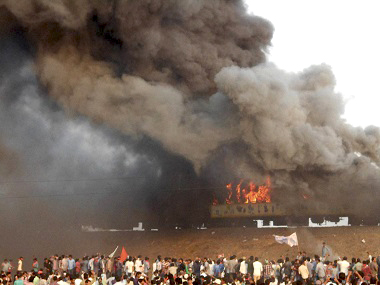
Vishakapatnam, Feb 1: Additional police and paramilitary forces were rushed to coastal Andhra Pradesh on Monday, a day after large-scale violence rocked Tuni town in East Godavari district during a protest by Kapus demanding reservation.
Police imposed prohibitory orders banning assembly of four or more persons across East Godavari district and beefed up security to prevent any untoward incident.
Senior police officials including additional director general of police (law and order) R P Thakur have reached Tuni to review the situation.
Police began investigations into Sunday’s violence in which a train, two police stations and 25 vehicles were torched. Fifteen policemen and four railway employees were injured in the violence.
The investigating officials were screening video footage to identify miscreants who torched train and police stations. The arrests are likely to be made later on Monday.
Personnel of Andhra Pradesh special police, central reserve police force (CRPF), rapid action force and Indo-Tibetan border police (ITBP) have been deployed in Tuni and other places in the district.
Kumar Viswajeet, inspector general of police, north coastal Andhra, told reporters in Tuni that forces were deployed in all places and that they were ready to deal with any situation.
More than 3,500 security personnel were deployed in Tuni and other sensitive places in the district.
Security has also been tightened in Vijayawada with deployment of special forces to prevent any violence.
Rail and road traffic between Visakhapatnam and Vijayawada restored late Sunday night after M Padmanabham, a key Kapu leader, announced withdrawal of agitation.
He, however, threatened to go on ‘fast-unto-death’ if the government failed to respond by Monday evening on the demand for including Kapus in the list of backward castes.
Several trains were cancelled or diverted since Sunday afternoon when protestors torched Ratnachal Express near Tuni station. All 24 bogies were gutted in the incident. Railway officials estimate the loss to be Rs.30 crore.
Chief minister N Chandrababu Naidu reviewed the situation with director general of police JV Ramudu and other top officials.
Terming the violence as ‘pre-planned’, Naidu asked officials to deal firmly with those involved.






Comments
r.h.s. v.h.p. hinduta & bjp only coz. of these terrorist. all this riots happening in india.
Add new comment